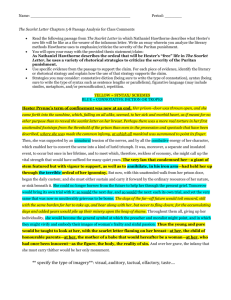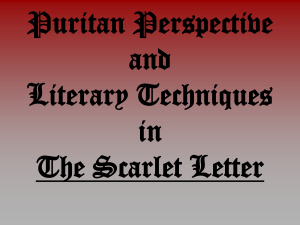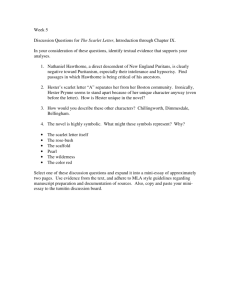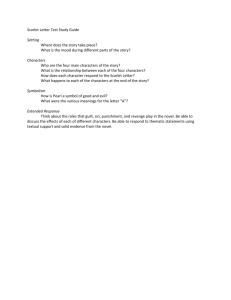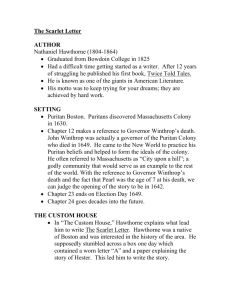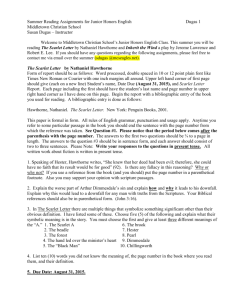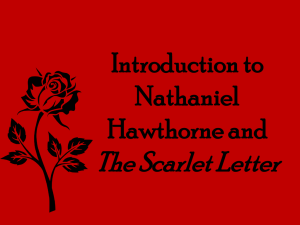Nathaniel Hawthorne & The Scarlet Letter: An Introduction
advertisement
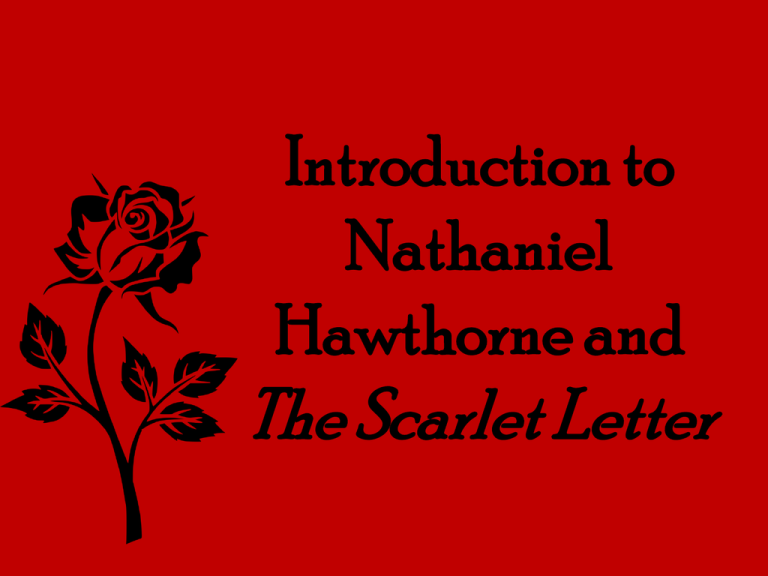
Introduction to Nathaniel Hawthorne and The Scarlet Letter Nathaniel Hawthorne • Born in Salem, MA in 1804 • Descendant of early Puritans • His father died at sea when he was 4 – he had a lonely childhood • 1837 published Twice Told Tales – Poe thought he was a genius Nathaniel Hawthorne • Ancestor Judge Hathorne of Witch Trial infamy • Changed spelling of his name to Hawthorne • Puritan heritage informed and haunted all of his writing Nathaniel Hawthorne • Worked in the Boston Custom House to support his writing career • Good friends with other American authors: Ralph Waldo Emerson, Herman Melville, and Henry Wadsworth Longfellow • Married Sophia Peabody in 1846 • Was found dead in 1864 by Franklin Pearce, former president of the United States, while they were on a trip to New Hampshire. Nathaniel Hawthorne Known also for his short stories • • • • • “Dr. Heidegger’s Experiment” “Young Goodman Brown” “The Minister’s Black Veil” “The Birthmark” “Rappaccini’s Daughter” Hawthorne’s Writings • • • • Strange and mysterious Symbolic imagery Evil and the nature of sin Where Poe focuses on the mind, Hawthorne tends to focus on the heart, which leads to analysis of the mind American Romanticism • • • • • • • • • Break from the lack of creative artistry of the Puritans Reflects the still innocent, pre-Civil War United States Glorifies the individual spirit Glorifies the beauty of nature Celebrates emotion Possibilities of imagination over reason Highly symbolic Features elements of the supernatural Favors emotion over intellect The Scarlet Letter Unity of Place • All action occurs in the center of Boston and the outskirts of the village • There are 3 scaffold scenes, one in the beginning, one in the middle, and one at the end – the 4 main characters are present at each one of these scenes, and in each one a different character takes ownership of his/her future. The Scarlet Letter Literary Devices • • • • Symbolism Irony Ambiguity Frame Narrative The Scarlet Letter Major Motifs: • • • • • • • • • Appearance vs. Reality Individual vs. Society Good vs. Evil / Dark vs. Light Nature vs. Civilization / Civil Law vs. Natural Law Hypocrisy Isolation / Alienation Women and femininity Supernatural Pride The Scarlet Letter Major Themes: • When society represses the expression of human needs, rebellion is a natural result. • Sin and/or guilt result in the psychological and physical deterioration of the sinner. • Humans need to feel connections to others. • The heart is superior to intellect. The Scarlet Letter Major Symbols: • • • • • • • • • • prison /prison door the scaffold rosebush , roses, weeds the letter A colors – red, green, & black the forest the town Pearl the black man names of characters Real People in the Book • Richard Bellingham, governor of the Massachusetts colony in 1641, 1654, 1665-1672 • Mistress Hibbins, sister of Governor Bellingham, was executed for witchcraft in 1656 • Reverend John Wilson, minister from England who arrived in Boston in 1630 Real People in the Book • Boston had a series of witch trials and five executions between 1648 and 1656. • On June 19, 1656, Mistress Ann Hibbins, sister of Governor Bellingham, was hanged for her "crime" of being a witch. She was the fifth and last witch to be executed in Boston until 1688. Puritan Judgment • Ministers and magistrates enacted the laws of God • All in the community were judges of the works and faith of others • Community members feared that one person’s sin would bring God’s wrath on all • Children were sometimes put with new parents so their real parents could not spoil them Puritan Punishment • any offense could lead to the pillory or stocks • imported this punishment England • entire purpose was public humiliation • stocks were built on a scaffold in the center of the village • townspeople could mock the offender and throw rotten vegetables or stones • aside from the offender’s hands being immobilized, his ears would frequently be nailed to the board behind his head Puritan Punishment In 1656 a woman accused of being blasphemous was sentenced to be whipped, fined, and forever to have a B “cutt out of ridd (red) cloth & sewed to her vper garment on her right arm in sight.” blasphemy: contemptuous or profane speech or action concerning God In 1633, Robert Coles had to stand as long as the court ordered with DRUNKARD on his back for “abuseing himself shamefully with drinke.” For the same crime the next year, Coles was sentenced to wear a D made of red cloth on a white background for a year Puritan Punishment In Massachusetts, anyone who interrupted a preacher during worship was reprimanded by the magistrate. If he did it again, he had to pay a fine of five pounds, and stand on a block four feet high with a sign in capital letters, WANTON GOSPELLER. wanton: rebellious gospeller: a person who zealously teaches or professes faith in the gospel Puritan Punishment Quaker George Bishop gave an account of another Quaker's treatment in New England. “The Drum was Beat, the People gather'd, Norton was fetch'd and stripp'd to the Waste, and set with his back to the Magistrates, and given in their View Thirty-six cruel Stripes with a knotted cord, and his hand made fast in the Stocks where they had set his Body before, and burn'd very deep with a Red-hot Iron with H. for Heresie.” heresy: belief or opinion contrary to religious doctrine Puritan Punishment Quakers were banished from Massachusetts, and the punishment for returning was painful. From 1657 records “A Quaker if male for the first offense shall have one of his ears cut off; for the second offense have his other eare cutt off; a woman shalbe severely whipt; for the third offense they, he or she, shall have their tongues bored through with a hot iron.” Offenders sometimes had their punishments mitigated by the clergy. A counterfeiter in was sentenced to death, but pleaded with the clergy and was only branded on his hand. Puritan Punishment Abel Buell was caught minting money on homemade plates. Historian John Warner Barber recorded the rest of his punishment: “The tip only of Buell's ear was cropped off: it was held on his tongue to keep it warm till it was put on the ear again, where it grew on. He was branded on the forehead as high up as possible.” This was usually done by a hot iron in the form of a letter designating the crime, which was held on the forehead of the criminal till he could say the words "God save the king." Buell later drew and printed the first copyrighted map of the United States. In 2011, one of the 7 copies of the map sold for $1.8 million dollars. Reviews of the Book • While the reviews were generally positive, others condemned The Scarlet Letter as smut. • The Scarlet Letter’s initial print run of 2500 books sold out in 10 days. • This signed 1st edition is currently on sale for $18,000. Unsigned, a first edition is worth $5,000. Many say the book is depressing and disheartening. Hawthorne himself once described The Scarlet Letter as “positively a hell-fired story, into which I found it impossible to throw any cheering light.”
